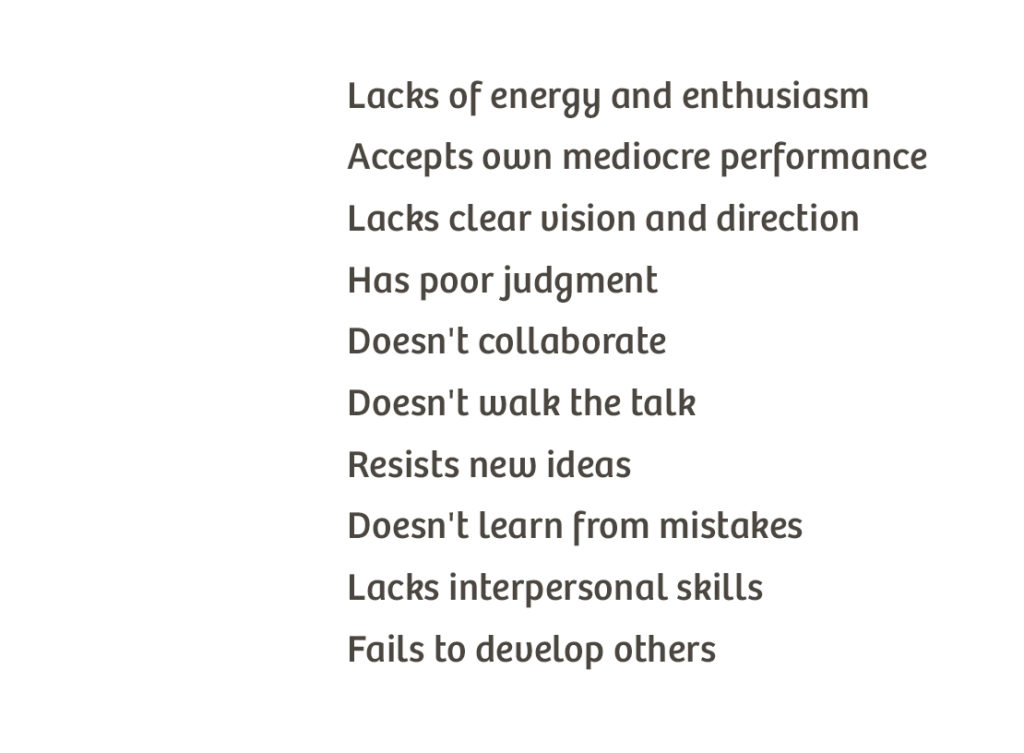What It Is:
The Ten Fatal Leadership Flaws are outlined by Joseph R. Folkman and Jack Zenger in their book “The Extraordinary Leader: Turning Good Managers into Great Leaders.” These flaws represent common pitfalls that leaders may encounter, hindering their effectiveness. Understanding these flaws can guide leadership development efforts.
The Ten Fatal Leadership Flaws:
- Lack of Energy and Enthusiasm:
- Leaders who lack energy and enthusiasm can struggle to inspire and motivate their teams. Coaching can focus on reigniting passion, finding purpose, and building a positive team culture.
- Acceptance of Mediocre Performance:
- Leaders who tolerate mediocre performance may hinder team excellence. Coaching can involve setting higher standards, providing constructive feedback, and fostering a culture of continuous improvement.
- Lack of Clear Vision and Direction:
- Leaders without a clear vision and direction may leave teams feeling adrift. Coaching can help leaders articulate a compelling vision, communicate effectively, and align the team toward common goals.
- Poor Judgment:
- Leaders with poor judgment may make decisions that negatively impact the team. Coaching can focus on enhancing decision-making skills, considering multiple perspectives, and seeking input from team members.
- Not Collaborative:
- Leaders who are not collaborative may stifle innovation and teamwork. Coaching can emphasize the importance of collaboration, effective communication, and building strong relationships within the team.
- Resistant to New Ideas:
- Leaders resistant to new ideas may hinder organizational adaptability. Coaching can encourage openness to innovation, willingness to listen, and a culture that values diverse perspectives.
- Not Learning from Mistakes:
- Leaders who fail to learn from mistakes may perpetuate ineffective practices. Coaching can promote a growth mindset, resilience, and a willingness to analyze and learn from both successes and failures.
- Lack of Core Interpersonal Skills:
- Leaders lacking core interpersonal skills may struggle to connect with and lead their teams effectively. Coaching can address communication, empathy, and relationship-building skills.
- Lack of Transparency:
- Leaders who lack transparency can create distrust within the team. Coaching can focus on fostering open communication, honesty, and transparency to build a culture of trust.
- Failure to Develop Others:
- Leaders who fail to develop others may inhibit team growth. Coaching can involve strategies for mentoring, providing feedback, and creating opportunities for skill development within the team.
How to Use It:
Using the Ten Fatal Leadership Flaws in Agile Coaching:
- Leadership Development Plans:
- Assess leaders within the Agile team for any signs of these flaws. Develop tailored leadership development plans to address specific areas for improvement.
- Feedback and 360-Degree Assessments:
- Utilize feedback mechanisms, including 360-degree assessments, to provide leaders with insights into their strengths and areas for improvement related to the ten flaws.
- Coaching Conversations:
- Engage in coaching conversations to explore the root causes of leadership challenges and collaboratively identify strategies for improvement.
- Training and Workshops:
- Offer training sessions and workshops focused on leadership development, emphasizing the importance of addressing these flaws in an Agile context.
By addressing the ten fatal leadership flaws, Agile coaches can contribute to building effective leadership within software delivery teams, fostering a culture of continuous improvement, collaboration, and innovation.
References:
1. Jack Zenger and Joseph Folkman (2009). “Ten Fatal Flaws That Derail Leaders”. Harvard Business Review. June 2009
- “The Extraordinary Leader: Turning Good Managers into Great Leaders” by Zenger and Folkman:
- The book provides an in-depth exploration of the ten fatal flaws, along with practical insights and strategies for leadership development.
- Leadership Development Programs:
- Explore leadership development programs and courses that draw on the principles outlined by Zenger and Folkman. Many training programs incorporate their research into leadership best practices.
- Zenger Folkman Website:
- Visit the Zenger Folkman website for additional resources, articles, and tools related to leadership development. The organization may offer insights and updates based on their ongoing research.
Visit the Agile Coach’s Toolkit for more definitions, models, theorems and stuff.

